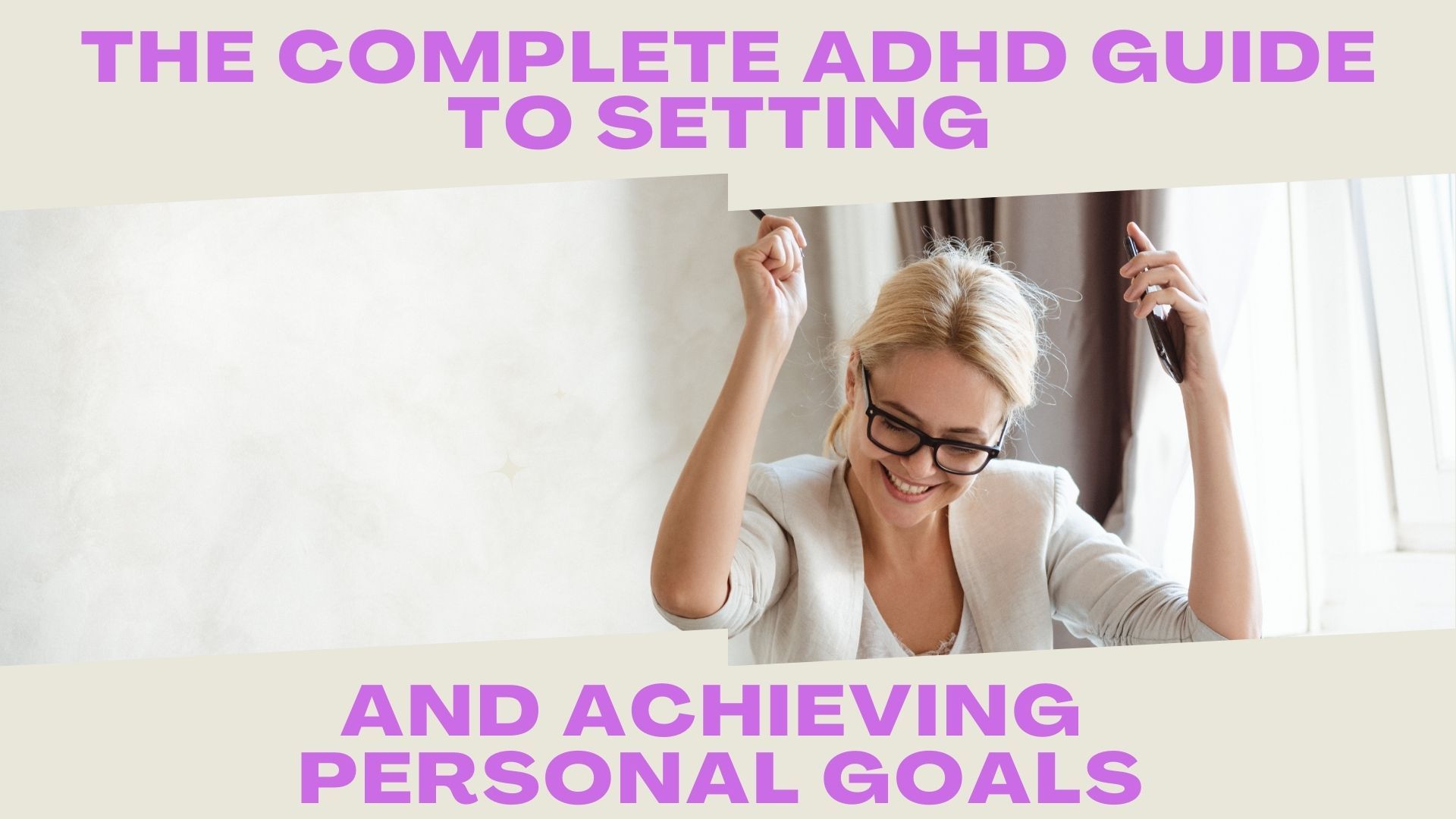The Complete ADHD Guide to Setting and Achieving Personal Goals

Do you often feel overwhelmed by your personal goals, wondering why they seem harder to achieve when you have ADHD? You're not alone. Many people with ADHD struggle to turn their aspirations into reality, feeling stuck in a cycle of ambition and frustration.
ADHD affects millions, influencing not just focus and attention but also how we set and pursue our goals. Daily life can feel like an uphill battle, with distractions and impulsivity hindering your progress. Traditional goal-setting advice might not cater to your unique way of thinking, leaving you without the tools for success.
But here's the good news: Achieving your personal goals with ADHD is not only possible but can be an empowering journey. By implementing strategies tailored to your brain's unique wiring, you can bypass common pitfalls and create a roadmap to success. Ready to transform your dreams into achievable milestones? Let's explore innovative strategies to help you stay focused, motivated, and reach your personal goals.
Understanding ADHD's Impact on Goal Setting
The Role of Dopamine in Motivation
Dopamine plays a crucial role in motivation, especially for individuals with ADHD. This neurotransmitter is linked to the brain's reward system and is more about anticipating rewards than receiving them. Simply expecting to achieve a goal can trigger dopamine release, driving you to seek out those rewards.
For those with ADHD, lower levels of dopamine and noradrenaline can lead to feeling under-stimulated. This often results in seeking activities that generate excitement, novelty, or competition to boost motivation and focus.
By understanding how dopamine influences your behaviour, you can tap into strategies that align with your brain's natural drive. Engaging in tasks that are interesting or present a sense of urgency can elevate dopamine levels, enhancing your motivation and focus.
Challenges in Pursuing Goals with ADHD
People with ADHD often face several hurdles when chasing their goals:
- Executive Functioning Difficulties: Planning, prioritising, and executing tasks can be challenging. Deciding on a realistic goal and breaking it down into steps may feel overwhelming.
- Emotional Obstacles: Feelings of disappointment, self-doubt, and fear of failure can make setting goals daunting.
- Procrastination: The tendency to delay tasks can stem from overwhelming emotions and difficulty concentrating, creating a cycle of avoidance and inadequacy.
- Maintaining Focus: Distractions can easily derail progress, making it essential to develop strategies to stay on track.
- Sustaining Interest: Initial motivation may wane over time. Regularly re-evaluating your motivations and staying accountable with support from friends or family can help keep you engaged.
By recognising these challenges, you can implement targeted strategies to navigate the goal-setting process more effectively.
Why Goal Setting Is Important for Individuals with ADHD
Boosting Motivation Through Goal Setting
Setting realistic goals can be a powerful catalyst for boosting motivation. When goals are clear and broken down into manageable steps, they provide a roadmap that turns overwhelming tasks into achievable actions.
This structured approach helps you focus and fosters a sense of accomplishment with each completed step. Celebrating small victories—like rewarding yourself with a favourite meal or sharing achievements with friends—can enhance your intrinsic motivation and build momentum towards larger objectives.
The Potential for Personal Growth
Personal growth is a journey towards reaching your fullest potential. While ADHD presents unique challenges, understanding and strategically addressing them is key to success.
- Create a Discrepancy: Recognise the gap between procrastination and your desired outcomes. This clarity can spark motivation.
- Build Confidence: Acknowledge past successes to reinforce your belief in your abilities.
- Celebrate Small Victories: Recognising and rewarding progress boosts morale and keeps you motivated.
By leveraging self-motivation techniques and setting clear, realistic goals, you can navigate your path towards self-improvement with greater success and fulfilment.
Strategies for Effective Goal Setting
Identifying Genuine and Meaningful Goals
To harness your potential and stay motivated, it's crucial to set goals that resonate deeply with you. Here's how:
- Self-Reflection: Understand your personal desires, values, and interests. Aligning goals with what truly matters to you increases engagement and commitment.
- Understand Your "Why": Clarify the reasons behind your goals. Connecting emotionally with your objectives can counteract feelings of overwhelm or disinterest.
- Focus on Behaviours and Habits: Instead of fixating on outcomes, concentrate on positive actions that will lead you towards your goals. For example, set a goal to "work on a task for 10 minutes each day" rather than "stop procrastinating."
By committing to genuine and meaningful habit-based goals, you increase motivation and reduce the likelihood of feeling overwhelmed.
Breaking Down Goals into Manageable Steps
Large goals can feel intimidating. Breaking them into smaller, actionable tasks makes them approachable and motivating.
- Dissect Your Goal: Identify the overarching aim and break it down. For example, writing a book can be broken into outlining chapters, writing sections, and editing drafts.
- Schedule Tasks: Assign manageable time frames to each task to stay organised and focused.
- Monitor Progress: Regularly check off completed tasks to visualise your advancement.
- Celebrate Successes: Recognise achievements, no matter how small, to bolster morale and maintain motivation.
This structured approach empowers you to take control of your goals and fosters an environment conducive to growth and achievement.
Incorporating Visual Reminders
Visual reminders can help you stay organised and focused:
- Sticky Notes: Place them in visible locations like your computer monitor or fridge to serve as constant cues.
- Whiteboards: Use them to list goals, deadlines, and daily tasks. Update them regularly and use colours or symbols for urgency.
- Calendars: Digital or physical calendars help you schedule tasks and visualise your time.
These tools not only enhance memory but also instil a sense of accountability.
Developing a Reward System
Creating a reward system can keep you motivated:
- Immediate Incentives: Reward yourself after completing small tasks. Enjoy a favourite snack or take a short break.
- Bigger Rewards: Treat yourself to something special after reaching significant milestones.
- Social Elements: Share your goals and celebrate achievements with friends or family for added motivation.
By incorporating rewards, you enhance focus, motivation, and satisfaction in achieving your objectives.
Creating an ADHD-Friendly Framework for Goals
The Importance of Structure and Routine
Establishing a consistent routine helps minimise distractions and enhances focus:
- Create a Roadmap: Outline your goals and break them into actionable steps.
- Build Consistency: Regular habits make it easier to stay on track without relying heavily on memory.
- Use Reminder Systems: Employ tools like planners, apps, or alarms to keep tasks and goals at the forefront.
- Enhance Time Management: Structured routines improve your ability to balance different aspects of life.
By prioritising organisation and structure, you can unlock your potential and make significant progress towards your goals.
Utilising Technology and Apps for Reminders
Digital tools can significantly enhance productivity:
- Forest: This app uses a gamified approach, encouraging you to stay focused by growing virtual trees as you complete tasks without distractions.
- Rule: For money management, Rule uses fun daily mini-games to help you budget and save in a way that works with the ADHD brain.
- Visual Reminders and Rewards: Integrate apps like Streaks that offer visual cues and reward systems to maintain motivation.
By leveraging technology, you can develop effective strategies to manage your time and make progress towards your goals.
Prioritising Realistic Goals
Setting Achievable Milestones
Establishing realistic milestones helps maintain motivation and reduces overwhelm:
- Use SMART Criteria: Ensure your goals are Specific, Measurable, Achievable, Relevant, and Time-bound.
- Break It Down: Divide larger goals into smaller tasks with specific deadlines.
- Celebrate Incremental Successes: Recognise and reward yourself for completing each milestone.
This approach empowers you to navigate challenges and increases your likelihood of achieving personal success.
Balancing Short-Term and Long-Term Goals
Balancing immediate objectives with future aspirations is key:
- Short-Term Goals: Provide immediate satisfaction and a sense of accomplishment.
- Long-Term Goals: Serve as the ultimate destination guiding your short-term efforts.
- Link Them Together: Use short-term goals as stepping stones towards your long-term vision.
- Utilise Tools: Planners, task lists, and reminders help track progress and stay organised.
By interlinking short-term and long-term goals, you cultivate a sense of direction and purpose.
Overcoming Common Obstacles
Strategies to Combat Procrastination
Procrastination can be a significant hurdle. Here's how to tackle it:
- Break Tasks Down: Smaller tasks are less overwhelming and easier to start.
- Set Specific Deadlines: Commit to time frames to enhance focus.
- Use Timers and Alarms: Tools like the Pomodoro Technique help maintain attention.
- Build Confidence: Remind yourself of past successes to boost self-efficacy.
- Accountability Partners: Share your goals with someone who can provide support and check on your progress.
- Write Down Goals: Documenting your objectives keeps you focused and committed.
Implementing these strategies can effectively combat procrastination and improve productivity.
Managing Distractions Effectively
To stay focused:
- Optimise Your Environment: Minimise auditory and visual disturbances.
- Establish Routines: Habit stacking links new tasks to established routines.
- Use Timers: Work in focused intervals with scheduled breaks.
- Identify Distractions: Recognise and address potential interruptions ahead of time.
- Set Boundaries: Limit access to distracting websites or apps during work periods.
- Stay Motivated: Connect tasks to personal interests to maintain engagement.
Effective distraction management requires a conducive environment and strategic planning.
Celebrating Progress and Achievements
The Importance of Recognising Small Wins
Acknowledging small victories is vital:
- Boosts Motivation: Reinforces a sense of progress and capability.
- Fosters a Positive Mindset: Shifts focus from shortcomings to achievements.
- Encourages Consistency: Reinforces positive behaviour and encourages ongoing effort.
- Cultivates Resilience: Builds confidence to face larger challenges.
By celebrating small wins, you enhance self-esteem and maintain an optimistic outlook on your goals.
Ways to Reward Yourself for Accomplishments
Here are effective ways to reward yourself:
- Enjoyable Activities: Watch a favourite show, play a game, or take a relaxing bath.
- Time Outdoors: Go for a walk or spend time in nature to rejuvenate.
- Creative Outlets: Indulge in hobbies like painting or playing music.
- Controlled Indulgences: Treat yourself to a new book or a small purchase.
- Social Celebrations: Share your achievements with friends or family.
- Integrate Rewards with Tasks: Combine tasks with enjoyable activities, like listening to an audiobook while exercising.
These rewards reinforce positive behaviour and keep you motivated on your journey.
Conclusion: Navigating Goal Setting with ADHD
Setting and achieving goals when you have ADHD can feel like a double-edged sword—exciting yet daunting. To navigate this, it's essential to establish a structured yet flexible framework that accommodates your unique challenges.
- Embrace SMART Goals: Create specific, measurable, attainable, relevant, and time-bound objectives.
- Break It Down: Divide larger goals into manageable tasks and celebrate incremental successes.
- Utilise Tools: Employ ADHD-friendly apps and reminder systems to stay organised.
- Practise Self-Awareness: Understand your strengths and triggers to tailor strategies to your needs.
- Monitor and Adjust: Stay open to changing your goals as circumstances evolve to prevent discouragement.
By embracing a holistic approach to goal setting, acknowledging both the joys and challenges, you can cultivate a positive and productive relationship with your aspirations. This leads to greater success and fulfilment in your pursuits.
Remember: Achieving your personal goals with ADHD isn't just possible—it's an empowering journey that can lead to profound personal growth. With the right strategies and mindset, you can turn your ambitions into reality.
